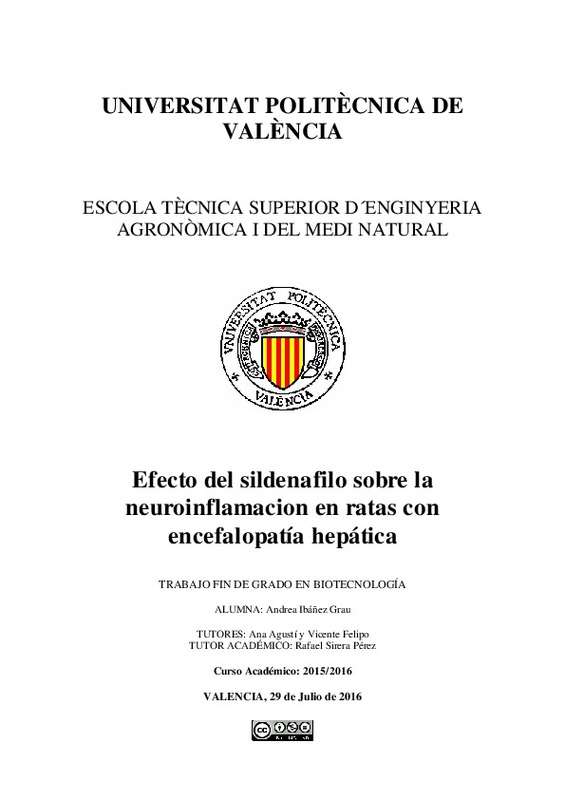JavaScript is disabled for your browser. Some features of this site may not work without it.
Buscar en RiuNet
Listar
Mi cuenta
Estadísticas
Ayuda RiuNet
Admin. UPV
Efecto del sildenafilo sobre la neuroinflamacion en ratas con encefalopatía hepática
Mostrar el registro sencillo del ítem
Ficheros en el ítem
| dc.contributor.advisor | Sirera Pérez, Rafael
|
es_ES |
| dc.contributor.advisor | Felipo Orts, Vicente
|
es_ES |
| dc.contributor.advisor | Agustí Feliu, Ana
|
es_ES |
| dc.contributor.author | Ibáñez Grau, Andrea
|
es_ES |
| dc.date.accessioned | 2016-09-30T15:19:15Z | |
| dc.date.available | 2016-09-30T15:19:15Z | |
| dc.date.created | 2016-09-13 | |
| dc.date.issued | 2016-09-30 | es_ES |
| dc.identifier.uri | http://hdl.handle.net/10251/70858 | |
| dc.description.abstract | [ES] La Encefalopatía Hepática (EH) es un síndrome neuropsiquiátrico complejo producido como consecuencia de un fallo hepático agudo o crónico. La EH tiene 4 fases, empieza con alteraciones de la personalidad y atención, progresa con una disminución de la función cognitiva y motora y finalmente provoca coma y muerte. Este fallo hepático provoca una disminución de la función del hígado, y por tanto, de la correcta detoxificación, acumulándose diferentes sustancias en el organismo entre las que se encuentra el amonio. El amonio se acumula en sangre y tejidos y cuando alcanza el cerebro produce la EH. Los principales responsables de la EH son la hiperamonemia y la neuroinflamación. La vía glutamato, óxido nítrico, GMPc (Glu-NO-GMPc), implicada en la función cognitiva, está alterada en modelos animales de hiperamonemia y EH. Las ratas hiperamonémicas o con EH tienen menos GMPc extracelular, y esta disminución se correlaciona además con una disminución de la función cognitiva en una tarea de discriminación condicionada en un laberinto en Y, de manera que la vía Glu-NO-GMPc es un indicador del deterioro cognitivo. El sildenafilo es un inhibidor de la fosfodiesterasa 5 (PDE5). La PDE5 degrada el GMPc a GMP y, por tanto el sildenafilo normaliza la función de la vía Glu-NO-GMPc y hace que aumente el GMPc extracelular mejorando el deterioro cognitivo, llegando a niveles similares al control. Por otro lado, se ha demostrado que algunos marcadores inflamatorios están alterados en cerebelo de ratas con EH. El objetivo de este trabajo es analizar por inmunohistoquímica la progresión de algunos marcadores de neuroinflamación a las 4, 9 y 12 semanas en ratas con anastomosis porto-cava, modelo animal de EH, y ratas sham tratadas con sildenafilo. | es_ES |
| dc.description.abstract | [EN] Hepatic encephalopathy (HE) is a complex neuropsychiatric syndrome produced as a result of a chronic or acute live failure. The HE starts with personality alterations, cognitive impairment, producing, finally comma and death. This hepatic failure produces a decreased in the liver function and, therefore, an incorrect detoxification, accumulating several substances in the organism as ammonium. The ammonium is accumulated in the blood and tissues and when it arrives to the brain produces HE. Hiperamonemia and neuroinflammation are the main responsible of HE. The pathway of glutamate nitric oxide cGMP (Glu-NO-cGMP) involved in the cognitive function, is altered in hyperammonemmia and HE model animals. Rats with hiperamonemia or HE showed a reduction of cGMP. The decreased of the function of this pathway correlates with impaired learning of a conditional discrimination task in a Y maze. Sildenafil is an inhibitor of phosphodiesterase 5 (PDE5). PDE5 degrades cGMP to GMP and, therefore, normalizes Glu-NO-cGMP pathway, produce an increase of extracellular cGMP improving the cognitive impairment, reaching similar levels of control rats. Moreover, it is observed an increase of neuroinflammatory brain markers in the HE rats. The aim of this work is analyze with immunohistochemistry the progression of some neuroinflammatory markers at 4, 9, and 12 weeks in rats with porta-caval shunt, an animal model of HE, and sham rats treated with sildenafil. | es_ES |
| dc.format.extent | 58 | es_ES |
| dc.language | Español | es_ES |
| dc.publisher | Universitat Politècnica de València | es_ES |
| dc.rights | Reconocimiento - No comercial - Sin obra derivada (by-nc-nd) | es_ES |
| dc.subject | Encefalopatía hepática | es_ES |
| dc.subject | Hiperamonemia | es_ES |
| dc.subject | Neuroinflamación | es_ES |
| dc.subject | Glu-NO-GMPc | es_ES |
| dc.subject | Sildenafilo | es_ES |
| dc.subject | Hepatic encephalopathy | es_ES |
| dc.subject | Neuroinflammation | es_ES |
| dc.subject | Sildenafil | es_ES |
| dc.subject.classification | MICROBIOLOGIA | es_ES |
| dc.subject.other | Grado en Biotecnología-Grau en Biotecnologia | es_ES |
| dc.title | Efecto del sildenafilo sobre la neuroinflamacion en ratas con encefalopatía hepática | es_ES |
| dc.type | Proyecto/Trabajo fin de carrera/grado | es_ES |
| dc.rights.accessRights | Abierto | es_ES |
| dc.contributor.affiliation | Universitat Politècnica de València. Departamento de Biotecnología - Departament de Biotecnologia | es_ES |
| dc.contributor.affiliation | Universitat Politècnica de València. Escuela Técnica Superior de Ingeniería Agronómica y del Medio Natural - Escola Tècnica Superior d'Enginyeria Agronòmica i del Medi Natural | es_ES |
| dc.description.bibliographicCitation | Ibáñez Grau, A. (2016). Efecto del sildenafilo sobre la neuroinflamacion en ratas con encefalopatía hepática. http://hdl.handle.net/10251/70858. | es_ES |
| dc.description.accrualMethod | TFGM | es_ES |
| dc.relation.pasarela | TFGM\44958 | es_ES |
Este ítem aparece en la(s) siguiente(s) colección(ones)
-
ETSIAMN - Trabajos académicos [3541]
Escuela Técnica Superior de Ingeniería Agronómica y del Medio Natural






